 On Tuesday, August 27 I logged into my online bank account to transfer some money, and saw an odd entry. It was so fresh, it hadn’t cleared my checking account yet, leading me to believe that the charge had just been made in the previous hour or two. The entry was a pre-authorized debit to AirBnB for $787.20. The entry included a confirmation code.
On Tuesday, August 27 I logged into my online bank account to transfer some money, and saw an odd entry. It was so fresh, it hadn’t cleared my checking account yet, leading me to believe that the charge had just been made in the previous hour or two. The entry was a pre-authorized debit to AirBnB for $787.20. The entry included a confirmation code.
I knew I hadn’t made a reservation on AirBnB, so I contacted my bank to inform them of the fraudulent charge. My hope was, that if I notified them right away, they could decline the charge. As I said, the charge had been pre-authorized, but it hadn’t been funded yet.
I admit, I don’t know what rules the bank has to follow once a charge has been pre-authorized, but I still don’t understand why they couldn’t have declined payment once they were aware that the charge was fraudulent. In any case, they didn’t decline the charge.
Next, I contacted AirBnB. The representative referred my issue to the AirBnB Trust and Safety Department. This is where things began to fall apart. Someone named Julia from the Trust and Safety Department sent me an email telling me that I should work with my bank to do a chargeback. The email went on to explain that, due to privacy concerns, AirBnB could not provide me with any information about who made the reservation (with my debit card) or what they reserved.
That kind of irritated me. My card was used fraudulently, but AirBnB was more concerned with protecting the privacy of the scum bag who stole my debit card info than with helping me. That just didn’t seem right.
Even so, I did as I was instructed and contacted my bank so they could do a charge back. I sent the person I was dealing with at the bank a copy of the email from AirBnB, and assumed the charge back process would be quick and easy. Boy, was I wrong.
The bank contacted me two days later to let me know that AirBnB wouldn’t deal with them. Initially, AirBnB told the bank that they weren’t entitled to a charge back because they weren’t an AirBnB member. {See Update #3 below. I initially misunderstood the explanation that the bank shared with me. Update #3 contains a detailed explanation.} The bank tried again to explain the process, but their email was blocked. The woman I was working with at the bank asked if I could contact AirBnB to let them know that my bank was trying to do a charge back for me.
I did as I was asked, and the process started all over again. This time, Conn from the AirBnB Trust and Safety Department sent me an email telling me to work with my bank to do a chargeback, and telling me that I had no right to know anything about the reservation that was made with my card.
I immediately sent another email asking Conn to please read my entire email and reach out to my bank to handle the charge back. Instead of doing that, Conn sent me another email telling me to contact my bank. He went on to say that if I had any questions, I should ask my bank. In other words, we’ve done all we’re going to do. Don’t bother us again.
Despite his effort to get rid of me, I reached out again (via email) to Conn and repeated my concerns. Conn gave up, but his partner, Joaquin, added insult to injury by sending me yet another form email just like the first two. I sent a strongly worded (READ: Angry) response to Joaquin letting him know that their charge back process had broken down and asking him to please reach out to my bank.
Joaquin couldn’t be bothered to reply to me, nor did he reach out to my bank, as requested.
A few days went by without any further contact from AirBnB, so I called them again. I spoke to Trish and explained everything that had happened to date. She had all of the information, including all of my emails asking AirBnB to return my $787.20 via chargeback to the bank. Trish seemed concerned about how things had been handled to that point and agreed not to send my case back to the Trust and Safety Department. At my request, Trish agreed to escalate my situation to someone in management at AirBnB. She advised that she would have Marion call me back “within the day.” She said she wasn’t sure when Marion would call, but she encouraged me to make myself available throughout the day. I agreed.
To my surprise (Although, at this point, I probably shouldn’t have been surprised), instead of a phone call from Marion, I received a slightly edited form email from Alfonse in the AirBnB Trust and Safety Department. The letter starts out like this:
“We’ve received your email and understand your concerns with the unauthorized and/or unrecognized charges you’ve reported. Unfortunately, it appears this charge has already been investigated and further reports of the same charge will not result in a different outcome.”
Really, AirBnB? Do you understand my concerns? If you do, you’ve never responded to them. I’ve told you several times that my bank has attempted to do a chargeback, but you wouldn’t deal with them. As things stand, a month after I notified you of this situation, you still have nearly $800 of mine that you received fraudulently, and you refuse to return it. You won’t even respond to my emails. And by respond, I mean engage with me. Read my emails and do what is necessary to remedy this situation.
AirBnB, I’d really like my money back. You received it through an act of fraud. You didn’t earn it. Please return it. At least six of your employees are aware of the situation, but none of them has lifted a finger to help me.
Please read my emails, reach out to my bank, and return my money. I really don’t think it’s too much to ask.
Update #1 — About 30 minutes after I posted a link to this post on Twitter, @AirBnBHelp reached out to me and offered to help. We corresponded a couple of times over the weekend, but ultimately, their response was no different than what I’ve been told all along. Here’s what they said:
“Thank you for that information Lou, we have reviewed your account and can see that our Trust team followed up with you on September 25th via email with information regarding your case. We encourage you to review that email for the complete details.”
The email that AirBnB refers to is the same email I quoted above where AirBnB told me to contact my bank and leave them alone. Talk about adding insult to injury.
Update #2 — Yesterday, I posted Update #1, and tweeted out the update on Twitter. A few hours later, I received the following note from AirBnB Help:
“We’re really sorry for the frustration, Lou. We’ve asked our specialized team to follow up with you as soon as possible. Thank you for your continued patience.”
That sounded promising, but rather than hearing from a specialized team, I heard from Marco in the Trust and Safety Department. And what did Marco say? He sent me the exact same form email I’ve received four times before telling me to contact my bank. I’ve made it clear to everyone I’ve communicated with that I’ve contacted my bank, but AirBnB refuses to engage with them. In fact, I have some additional information about AirBnB’s response to the bank that I’ll be posting a little later. The saga continues…
Update #3 – This update gets a little technical, but I think it will help explain why AirBnB is refusing to deal with my bank.
When my bank contacted AirBnB and requested a chargeback (as requested over and over again by AirBnB in emails to me), my bank received a memo indicating that the bank did not have dispute rights for the charge. The memo stated:
“According to the network dispute resolution rules, there are no dispute rights for this transaction. This is due to the merchant participating in the ‘3D Secure’ program, and the transaction obtaining an authorization message.”
Let’s break this down a little. The merchant referred to in this paragraph is AirBnB. They subscribe to “3D Secure,” which, according to Wikipedia, is:
“…an XML-based protocol designed to be an additional security layer for online credit and debit card transactions. It was originally developed by Arcot Systems (now CA Technologies) and first deployed by Visa with the intention of improving the security of internet payments, and is offered to customers under the Verified by Visa/Visa Secure brands…EMV 3-D Three Domain Secure (3DS) is a messaging protocol developed by EMVCo to enable consumers to authenticate themselves with their card issuer when making card not present (CNP) transactions. The additional security layer helps prevent unauthorized CNP transactions and protects the merchant from CNP exposure to fraud. The three domains Secure consist of the merchant/acquirer domain, issuer domain, and the interoperability domain (e.g. Payment Systems).”
Okay, that’s long and boring, but in a nutshell, 3D Secure is a security system designed to be used when the credit or debit card is not present, as with internet purchases. According to my bank, the way 3D Secure works in practice is the purchaser enters their card number, and then a box pops-up asking the purchaser to provide an authorization code that the merchant provides via text.
In order for this particular purchase with AirBnB to have been approved (assuming it was), AirBnB would have had to send an authorization code to the purchaser. Since it was my debit card that was used, I assume I’m considered the purchaser, but I never received a text containing an authorization code. Somehow, assuming AirBnB used 3D Secure properly and required an authorization code (I have no way of knowing if the transaction was handled properly since I wasn’t involved), they would have had to send an authorization code to a cell phone other than mine.
There are a couple of things to consider. First, assuming you didn’t nod off while reading the Wikipedia explanation of 3D Secure, you probably noticed that it said 3D Secure adds an additional layer of security that “helps prevent unauthorized CNP transactions and protects the merchant from CNP exposure to fraud.” In other words, 3D Secure primarily protects the merchant, not the consumer.
In this same vein, the Wikipedia article goes on to say:
“Analysis of the first version of protocol by academia has shown it to have many security issues that effect the consumer, including a greater surface area for phishing and a shift of liability in the case of fraudulent payments.”
So, here’s the bottom line: AirBnB subscribes to a cyber-security system that has been shown to be flawed, and was obviously flawed in this case. Even so, they are standing behind the 3D Secure rules that state that they don’t have to return payments to consumers, even if those payments were received through fraudulent means. Seems pretty sweet for AirBnB, but it really sucks for the consumer.
As I think this through, there are only two ways that AirBnB could have charged by card without my permission. The first is that they didn’t follow the 3D Secure protocols and did not require an authorization code before charging my card. If this happened, AirBnB is obviously negligent in their actions and should not be able to hide behind the 3D Secure rules.
The second way is if the person who stole my debit card info created an AirBnB member profile, and connected their own cell phone number and my card number to their profile. Then, when AirBnB sent the authorization code, the scammer entered it and the transaction was complete. But can it really be this easy to scam AirBnB? If this is all it takes, the 3D Secure protocol is useless. If anyone can set up an AirBnB profile and can attach a stolen debit card to it without AirBnB requiring verification, the 3D Secure protocols are meaningless and serve to protect no one other than the merchant.
Certainly, AirBnB understands this. Their system is easily usurped, yet they continue to rely on it to the detriment of their customers. This is obviously wrong and shouldn’t be allowed.
So, what’s next? I don’t know. Various people have suggested I sue in small claims court. I really don’t want to deal with that headache, but I hate seeing someone in power (AirBnB) take advantage of someone who has no power (me). So, it’s a possibility. I’ll keep you posted.
Update #4 — I hate how this is all playing out with AirBnB. I used to like the company and thought they had a terrific, useful product. I enjoyed my experience with them, and had planned on using them again. Unfortunately, the way they have handled my situation leads me to believe they are an untrustworthy company that deals with customer issues in bad faith. I’m not the only one who feels this way. Check out this article on Vice.com by Allie Conti about her experience with AirBnB. Our issues are different, but AirBnB’s response to our issues is very similar.

 My old website was really dated. It had gotten to the point where I couldn’t update the theme or some of the plug-ins anymore because the php code was too old (I’m not really sure what that means). I’ve been looking into new WordPress themes, or maybe even a new website builder, but I haven’t found anything I like yet.
My old website was really dated. It had gotten to the point where I couldn’t update the theme or some of the plug-ins anymore because the php code was too old (I’m not really sure what that means). I’ve been looking into new WordPress themes, or maybe even a new website builder, but I haven’t found anything I like yet.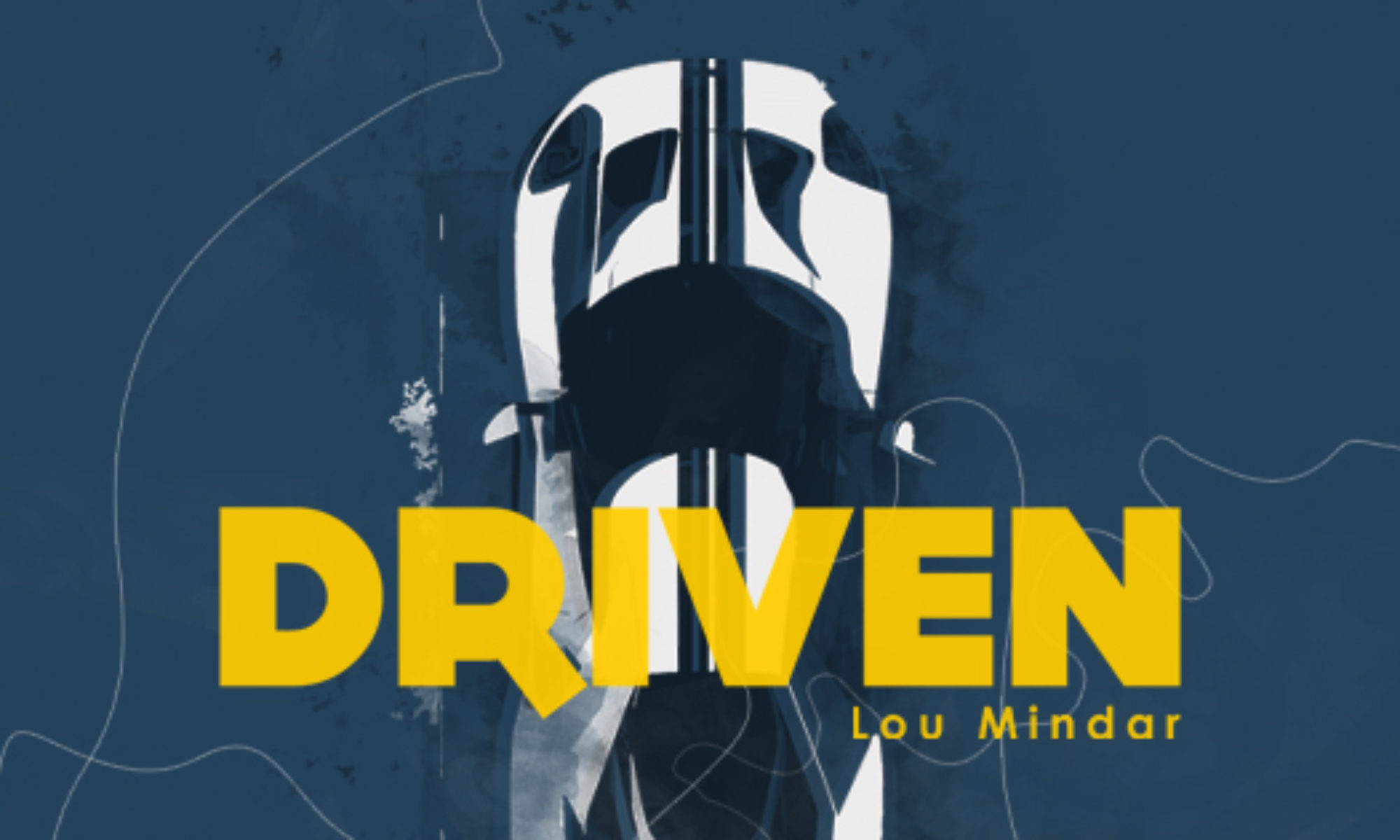
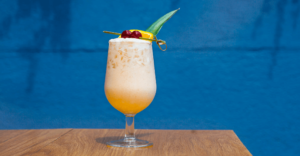 Have you ever heard the song “Escape (The Pina Colada Song)” by Rupert Holmes? Everyone over the age of fifty or so has probably heard the song hundreds of times. It was a number one hit and was played incessantly on the radio in the late 1970s. If you’ve never heard the song, let me tell you about it.
Have you ever heard the song “Escape (The Pina Colada Song)” by Rupert Holmes? Everyone over the age of fifty or so has probably heard the song hundreds of times. It was a number one hit and was played incessantly on the radio in the late 1970s. If you’ve never heard the song, let me tell you about it.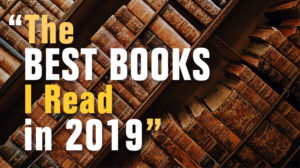 I’m getting a late jump on listing the best books I read in 2019. I’ve had some personal things going on over the past few months that have knocked me out of commission. I may write about those things here on the blog soon, or I may not say anything, and you’ll naturally assume the worst.
I’m getting a late jump on listing the best books I read in 2019. I’ve had some personal things going on over the past few months that have knocked me out of commission. I may write about those things here on the blog soon, or I may not say anything, and you’ll naturally assume the worst.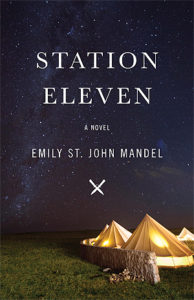 10. Station Eleven by Emily St. John Mandel – I had heard good things about Station Eleven before reading it. Unfortunately, I saw in the description of the book that the story takes place in a dystopian world following the collapse of society. I’m not really into dystopian novels. I’ve read a few and had trouble telling one from the other. Even so, I read Station Eleven and was pleasantly surprised. The story is unique, the characters are well developed, and the writer does a good job of keeping the reader engaged, not spending too much time explaining the rules of the world she has created. I’m not ready for another dystopian novel any time soon, but I’m glad I read Station Eleven.
10. Station Eleven by Emily St. John Mandel – I had heard good things about Station Eleven before reading it. Unfortunately, I saw in the description of the book that the story takes place in a dystopian world following the collapse of society. I’m not really into dystopian novels. I’ve read a few and had trouble telling one from the other. Even so, I read Station Eleven and was pleasantly surprised. The story is unique, the characters are well developed, and the writer does a good job of keeping the reader engaged, not spending too much time explaining the rules of the world she has created. I’m not ready for another dystopian novel any time soon, but I’m glad I read Station Eleven.
 8. The Long Flight Home by Alan Hlad – The Long Flight Home takes place in England during World War II and is inspired by true events. Susan lives with her grandfather, and together, they raise carrier pigeons. The British military contacts them and asks for their help delivering messages to British troops in German-occupied France. Ollie is a crop duster from Maine who is determined to join the Royal Air Force. When his plans change and he finds himself alone in England, he meets Susan, and helps her and her grandfather with the pigeons. The relationship between Susan and Ollie grows as they work together, but the fates of war are not going to make it easy for them to be together. For some reason, I can’t get enough of books that take place during World War II, and The Long Flight Home definitely fits the bill.
8. The Long Flight Home by Alan Hlad – The Long Flight Home takes place in England during World War II and is inspired by true events. Susan lives with her grandfather, and together, they raise carrier pigeons. The British military contacts them and asks for their help delivering messages to British troops in German-occupied France. Ollie is a crop duster from Maine who is determined to join the Royal Air Force. When his plans change and he finds himself alone in England, he meets Susan, and helps her and her grandfather with the pigeons. The relationship between Susan and Ollie grows as they work together, but the fates of war are not going to make it easy for them to be together. For some reason, I can’t get enough of books that take place during World War II, and The Long Flight Home definitely fits the bill.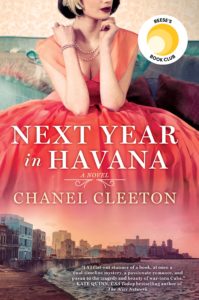 7. Next Year in Havana by Chanel Cleeton – Next Year in Havana tells the story of a family in Cuba coming to grips with their changing lives in the face of the rise of Fidel Castro. Much has been written about this time in Cuba, but one of the things I appreciate about the author was how she wove in the struggles current day Cubans—both in Cuba and the United States—have with the island nation. She captures the love/hate relationship they had and have with Cuba. Part of the book takes place in 1958, just before the revolution, and part takes place in 2017 in both Havana and Miami, as relations between the US and Cuba are starting to thaw. I’ve always been drawn to the history and culture of Cuba. Next Year in Havana did a great job of sharing the history and immersing me in the culture of our Caribbean neighbor.
7. Next Year in Havana by Chanel Cleeton – Next Year in Havana tells the story of a family in Cuba coming to grips with their changing lives in the face of the rise of Fidel Castro. Much has been written about this time in Cuba, but one of the things I appreciate about the author was how she wove in the struggles current day Cubans—both in Cuba and the United States—have with the island nation. She captures the love/hate relationship they had and have with Cuba. Part of the book takes place in 1958, just before the revolution, and part takes place in 2017 in both Havana and Miami, as relations between the US and Cuba are starting to thaw. I’ve always been drawn to the history and culture of Cuba. Next Year in Havana did a great job of sharing the history and immersing me in the culture of our Caribbean neighbor.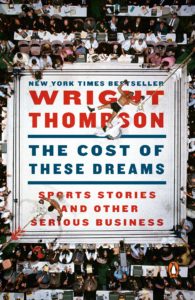 6. The Cost of These Dreams by Wright Thompson – For years, Frank DeFord was recognized as the dean of long form sports writers. He was celebrated in the pages of Sports Illustrated, and his stories carried him outside of sports onto the national stage. For me, Wright Thompson is our current version of Frank DeFord. He’s a terrific writer, but he also brings a unique perspective. He has a way of taking a subject—whether profiling former Ohio State Football Coach Urban Meyer or telling the story of a round of golf he shared with his father—and turning it into more. More meaningful, more emotional, more universal. Wright grew up in the cradle of Southern writers—Oxford, Mississippi—and brings a literary eye to sports writing. In The Cost of These Dreams, Thompson shares several essays that were previously printed in ESPN the Magazine. They showcase the depth and breadth of a true artist at the top of his craft.
6. The Cost of These Dreams by Wright Thompson – For years, Frank DeFord was recognized as the dean of long form sports writers. He was celebrated in the pages of Sports Illustrated, and his stories carried him outside of sports onto the national stage. For me, Wright Thompson is our current version of Frank DeFord. He’s a terrific writer, but he also brings a unique perspective. He has a way of taking a subject—whether profiling former Ohio State Football Coach Urban Meyer or telling the story of a round of golf he shared with his father—and turning it into more. More meaningful, more emotional, more universal. Wright grew up in the cradle of Southern writers—Oxford, Mississippi—and brings a literary eye to sports writing. In The Cost of These Dreams, Thompson shares several essays that were previously printed in ESPN the Magazine. They showcase the depth and breadth of a true artist at the top of his craft.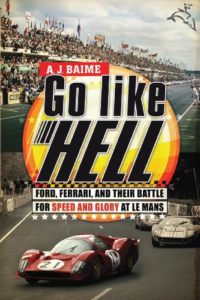 5. Go Like Hell: Ford, Ferrari and Their Battle for Speed and Glory at LeMans by A.J. Baime – Last fall, I was very excited to see the movie Ford vs Ferrari starring Matt Damon and Christian Bale. Damon plays Carroll Shelby, a legendary racer and character, and the inspiration for my daughter’s name (Shelby). But before seeing the movie, I wanted to read the book it was based on. As much as I liked the movie (I thought it was great), I liked the book even better. Go Like Hell gets into all of the details of the story that the movie didn’t have time for. The author did a great job of introducing us to the characters and slowly building the story. Everything was in just the right place. Reading Go Like Hell was a wonderful ride.
5. Go Like Hell: Ford, Ferrari and Their Battle for Speed and Glory at LeMans by A.J. Baime – Last fall, I was very excited to see the movie Ford vs Ferrari starring Matt Damon and Christian Bale. Damon plays Carroll Shelby, a legendary racer and character, and the inspiration for my daughter’s name (Shelby). But before seeing the movie, I wanted to read the book it was based on. As much as I liked the movie (I thought it was great), I liked the book even better. Go Like Hell gets into all of the details of the story that the movie didn’t have time for. The author did a great job of introducing us to the characters and slowly building the story. Everything was in just the right place. Reading Go Like Hell was a wonderful ride.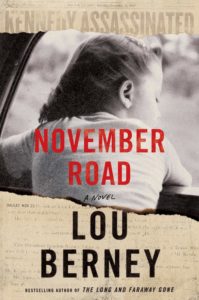 4. November Road by Lou Berney – In years past, I’ve read a lot of books written by Don Winslow. I think he’s a terrific writer and I’ve enjoyed several of his books, including The Winter of Frankie Machine, The Cartel, The Dawn Patrol, and Satori. I follow Winslow on Twitter and saw that he was recommending a book by Lou Berney. I had never heard of Berney, but I trusted Winslow’s recommendation. So, I read Berney’s book, November Road, and was blown away. November Road is an extremely well-crafted mystery novel that takes place in the 1960’s with the JFK assassination as a backdrop. I also read Berney’s book The Long and Faraway Gone in 2019, and if my list was one or two books longer, Berney would have had two books on it.
4. November Road by Lou Berney – In years past, I’ve read a lot of books written by Don Winslow. I think he’s a terrific writer and I’ve enjoyed several of his books, including The Winter of Frankie Machine, The Cartel, The Dawn Patrol, and Satori. I follow Winslow on Twitter and saw that he was recommending a book by Lou Berney. I had never heard of Berney, but I trusted Winslow’s recommendation. So, I read Berney’s book, November Road, and was blown away. November Road is an extremely well-crafted mystery novel that takes place in the 1960’s with the JFK assassination as a backdrop. I also read Berney’s book The Long and Faraway Gone in 2019, and if my list was one or two books longer, Berney would have had two books on it.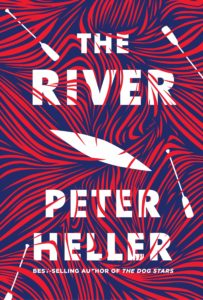 3. The River by Peter Heller – The River is the story of two college friends who go for a long canoe and camping trip in northern Canada. Their idyllic trip is interrupted by a huge wildfire closing in on them. They’re in a rush to get off the river and out of the woods, but they are halted when they hear a couple arguing in the distance, and then come upon a man paddling the river alone. Have they just run across a murderer? Will they be able to find out before the wildfire consumes them? Heller’s writing is tremendous. The world he created is serene, yet unforgiving, and his story only slows down enough so the reader can catch their breath before plunging ahead into another conflict or adventure.
3. The River by Peter Heller – The River is the story of two college friends who go for a long canoe and camping trip in northern Canada. Their idyllic trip is interrupted by a huge wildfire closing in on them. They’re in a rush to get off the river and out of the woods, but they are halted when they hear a couple arguing in the distance, and then come upon a man paddling the river alone. Have they just run across a murderer? Will they be able to find out before the wildfire consumes them? Heller’s writing is tremendous. The world he created is serene, yet unforgiving, and his story only slows down enough so the reader can catch their breath before plunging ahead into another conflict or adventure.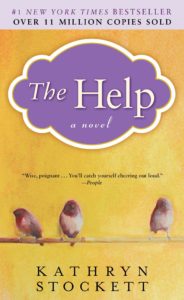 2. The Help by Kathryn Stockett – By now, I assume most of you have seen the movie, The Help, that was based on this book. Both the movie and the book were terrific, but of the two, I thought the book was better. Rather than talk about the story, I’d like to use The Help to briefly talk about something that has been in the news recently. The book, American Dirt by Jeanine Cummins, was catapulted to fame when it was selected for the Oprah Winfrey Book Club. Then, it was harshly criticized throughout the media. I haven’t read the book and don’t know if it was any good, but the quality of the writing isn’t what’s being criticized. What many pundits are critical of is the fact that a white female writer wrote about a Mexican woman and her child who flee Mexico after her family is killed, being chased into the US by narcotraffickers along the way. Critics accuse Cummins of cultural appropriation, claiming that she does not have the right to create characters or storylines that aren’t part of her lived experience. In other words, she can only write about people like her and situations she has experienced. I call BS. Kathryn Stockett, the author of The Help, is a privileged white woman who grew up in Jackson, Mississippi (where the story takes place), but she has never been black, never been poor, and never been a domestic worker in Jackson, working for rich white people. Yet, she created a wonderful and important book, not just from her own experiences, but from her research and imagination. The Help is a work of fiction, and the world would be a worse place without it.
2. The Help by Kathryn Stockett – By now, I assume most of you have seen the movie, The Help, that was based on this book. Both the movie and the book were terrific, but of the two, I thought the book was better. Rather than talk about the story, I’d like to use The Help to briefly talk about something that has been in the news recently. The book, American Dirt by Jeanine Cummins, was catapulted to fame when it was selected for the Oprah Winfrey Book Club. Then, it was harshly criticized throughout the media. I haven’t read the book and don’t know if it was any good, but the quality of the writing isn’t what’s being criticized. What many pundits are critical of is the fact that a white female writer wrote about a Mexican woman and her child who flee Mexico after her family is killed, being chased into the US by narcotraffickers along the way. Critics accuse Cummins of cultural appropriation, claiming that she does not have the right to create characters or storylines that aren’t part of her lived experience. In other words, she can only write about people like her and situations she has experienced. I call BS. Kathryn Stockett, the author of The Help, is a privileged white woman who grew up in Jackson, Mississippi (where the story takes place), but she has never been black, never been poor, and never been a domestic worker in Jackson, working for rich white people. Yet, she created a wonderful and important book, not just from her own experiences, but from her research and imagination. The Help is a work of fiction, and the world would be a worse place without it.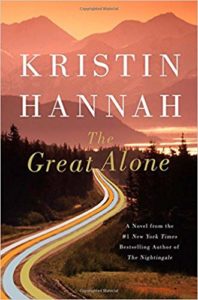 1. The Great Alone by Kristin Hannah – You can be pretty sure that a book is good if it stays with you for weeks after reading it. It has been six months since a read The Great Alone and I still think about it often. The story is about a family from the northwest United States who moves to Alaska in 1974 after inheriting some land. The family consists of Ernt, a former POW from the Viet Nam war, his wife, Cora, and their thirteen-year-old daughter, Leni. What they find in Alaska is a beautiful, but unforgiving, land. Life is hard, made all the harder by Ernt’s frequent angry outbursts. He beats Cora when he’s angry. She makes excuses for him, never holding a grudge. Leni loves her father, but sees his dark side and does everything she can to avoid it. When a neighbor takes steps to modernize the town in order to take advantage of tourist dollars, Ernt does everything in his power to stop the inevitable. Hannah does a masterful job crafting the characters and the storyline. The Great Alone deserves to be the best book I read in 2019.
1. The Great Alone by Kristin Hannah – You can be pretty sure that a book is good if it stays with you for weeks after reading it. It has been six months since a read The Great Alone and I still think about it often. The story is about a family from the northwest United States who moves to Alaska in 1974 after inheriting some land. The family consists of Ernt, a former POW from the Viet Nam war, his wife, Cora, and their thirteen-year-old daughter, Leni. What they find in Alaska is a beautiful, but unforgiving, land. Life is hard, made all the harder by Ernt’s frequent angry outbursts. He beats Cora when he’s angry. She makes excuses for him, never holding a grudge. Leni loves her father, but sees his dark side and does everything she can to avoid it. When a neighbor takes steps to modernize the town in order to take advantage of tourist dollars, Ernt does everything in his power to stop the inevitable. Hannah does a masterful job crafting the characters and the storyline. The Great Alone deserves to be the best book I read in 2019.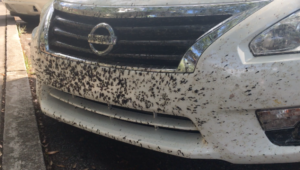 I took my car to the car wash today. The front of the car was covered with dead love bugs. Those nasty little critters have been swarming for the past few weeks. They can cause all kinds of problems, including clogging up car radiators, and, if you don’t wash them off soon enough, their acidic little bodies can eat away at the car’s clear coat.
I took my car to the car wash today. The front of the car was covered with dead love bugs. Those nasty little critters have been swarming for the past few weeks. They can cause all kinds of problems, including clogging up car radiators, and, if you don’t wash them off soon enough, their acidic little bodies can eat away at the car’s clear coat. On Tuesday, August 27 I logged into my online bank account to transfer some money, and saw an odd entry. It was so fresh, it hadn’t cleared my checking account yet, leading me to believe that the charge had just been made in the previous hour or two. The entry was a pre-authorized debit to AirBnB for $787.20. The entry included a confirmation code.
On Tuesday, August 27 I logged into my online bank account to transfer some money, and saw an odd entry. It was so fresh, it hadn’t cleared my checking account yet, leading me to believe that the charge had just been made in the previous hour or two. The entry was a pre-authorized debit to AirBnB for $787.20. The entry included a confirmation code.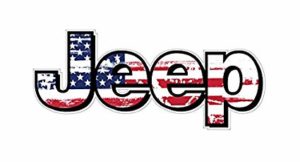 I hate to spew my personal issues on this blog. I started it to talk about my writing and to share stories I find interesting or inspiring. But as it turns out, people like it when I complain. We all have issues we’re dealing with in our lives, and as the old saying goes, misery loves company. So, for those that enjoy my complaining, I have a real treat for you. My next two posts will be nothing but complaining. Ready? Here goes.
I hate to spew my personal issues on this blog. I started it to talk about my writing and to share stories I find interesting or inspiring. But as it turns out, people like it when I complain. We all have issues we’re dealing with in our lives, and as the old saying goes, misery loves company. So, for those that enjoy my complaining, I have a real treat for you. My next two posts will be nothing but complaining. Ready? Here goes.
 I drive a lot, spending a good part of my life on the roads between Wisconsin, Tennessee, Florida and all the states in between. And I can tell you, there are some really bad drivers out on our highways. I’m constantly amazed at the ignorance people have for the rules of the road, as well as a lack of common decency. I don’t advocate road rage, but often, I can understand it.
I drive a lot, spending a good part of my life on the roads between Wisconsin, Tennessee, Florida and all the states in between. And I can tell you, there are some really bad drivers out on our highways. I’m constantly amazed at the ignorance people have for the rules of the road, as well as a lack of common decency. I don’t advocate road rage, but often, I can understand it.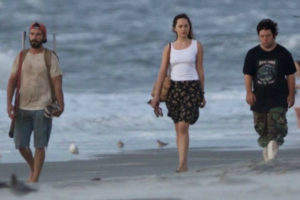 This is a story about two guys from different sides of the country who shared a single dream.
This is a story about two guys from different sides of the country who shared a single dream.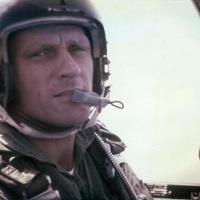 Roy Knight always knew he’d join the military. After all, it was kind of the family business. All five of his older brothers had joined the military before him and had fought in World War II. Roy was too young for the Second Great War, but that didn’t stop him from joining the Air Force just a few days past his seventeenth birthday in 1948.
Roy Knight always knew he’d join the military. After all, it was kind of the family business. All five of his older brothers had joined the military before him and had fought in World War II. Roy was too young for the Second Great War, but that didn’t stop him from joining the Air Force just a few days past his seventeenth birthday in 1948.